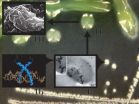(Press-News.org) Researchers from Queen Mary University of London have found genetic evidence that one of Britain's native tree species, the dwarf birch found in the Scottish Highlands, was once common in England.
Genes from dwarf birch were found in birch tree populations across Britain, which reflects a much wider distribution occupied by the "wee tree" when the British climate was colder.
"We seem to have found genetic footprints of the retreat of dwarf birch into its current refuges in the Scottish Highlands," said Dr Richard Buggs, Senior Lecturer at Queen Mary's School of Biological and Chemical Sciences, who led the research.
"As dwarf birch moved north, some of its genes were picked up by downy birch trees, which spread through Britain at the cost of dwarf birch. The two species cross-pollinated in many parts of Britain after the last glacial maximum as the climate warmed and ice age glaciers melted away."
Co-author and PhD student Nian Wang adds: "Our genetic results fit well with the fact that fossil pollen from dwarf birch has been found in parts of England and Wales. As global warming continues, stray genes and fossils could be all that is left of dwarf birch in Britain."
The current scarcity of dwarf birch seems to be a combination of the effects of global warming, deer grazing and burning plants and trees on moors.
Another risk the study highlights is hybridisation or cross-breeding. Richard Nichols, Professor of Evolutionary Genetics at QMUL points out: "We suspect that the influx of pollen from other birch species is actively harmful to the dwarf populations, especially since the larger trees produce much more pollen."
The study has good news for conservation groups planting dwarf birch. By using computer models to predict ecological niches, the scientists identified many areas where dwarf birch could potentially grow under current climates.
INFORMATION:
The study is published in the journal Molecular Ecology today (Friday 25 April) and funded by NERC.
Genetic legacy of rare dwarf trees is widespread
2014-04-25
ELSE PRESS RELEASES FROM THIS DATE:
Interactive training halves malaria overdiagnosis and prevents wastage of drugs
2014-04-25
AUDIO:
New research published on World Malaria Day finds that interactive training for health workers can halve malaria overdiagnosis and prevent wastage of drugs. In this audio interview, lead author Dr....
Click here for more information.
Interactive training programmes for health workers could reduce overdiagnosis of malaria by half and help prevent valuable drugs from being wasted on patients who don't have the disease, according to new research published on World Malaria ...
Store doping samples for 10 years to stop sports cheats, say anti-doping bodies
2014-04-25
Blood and urine samples taken from athletes to spot signs of doping should be stored for 10 years, to enable technology to catch up with substances that currently evade detection, says a consensus statement of international anti-doping bodies, published in a special issue of the British Journal of Sports Medicine.
And much wider use should be made of biological profiling—the athlete's "biological passport"—which will show up tiny changes made to the individual's unique genetic blueprint by doping substances and methods, without the need to identify the presence of the ...
Increasing consumption of coffee is associated with reduced risk of type 2 diabetes
2014-04-25
New research published in Diabetologia (the journal of the European Association for the Study of Diabetes) shows that increasing coffee consumption by on average one and half cups per day (approx 360ml) over a four-year period reduces the risk of type 2 diabetes by 11%. The research is led by Dr Frank Hu and Dr Shilpa Bhupathiraju, Department of Nutrition, Harvard School of Public Health, Harvard University, Boston, MA, USA, and colleagues.
Coffee and tea consumption has been associated with a lower type 2 diabetes risk but little is known about how changes in coffee ...
Increasing daily coffee consumption may reduce type 2 diabetes risk
2014-04-25
Boston, MA — People who increased the amount of coffee they drank each day by more than one cup over a four-year period had a 11% lower risk for type 2 diabetes than those who made no changes to their coffee consumption, according to a new study led by Harvard School of Public Health (HSPH) researchers. In addition, the study found that those who decreased their coffee consumption by more than a cup per day increased their type 2 diabetes risk by 17%.
"Our findings confirm those of previous studies that showed that higher coffee consumption was associated with lower ...
Researchers trace HIV adaptation to its human host
2014-04-25
"Much research has focused on how HIV adapts to antiviral drugs – we wanted to investigate how HIV adapts to us, its human host, over time," says lead author Zabrina Brumme from Simon Fraser University.
In a study published in PLOS Genetics, which traces the evolution of HIV in North America, the Brumme lab and colleagues at the BC Centre for Excellence in HIV/AIDS, Harvard University, the New York Blood Center, and The San Francisco Department of Public Health found evidence that the virus is slowly adapting over time to its human hosts. However, this change is so gradual ...
Low-dose natural antimicrobial exacerbates chronic lung infection in cystic fibrosis
2014-04-25
Respiratory failure caused by chronic lung infection with Pseudomonas aeruginosa bacteria is a common cause of death in patients with cystic fibrosis (CF), a genetic disease that is common in individuals of European descent. A study published on April 24th in PLOS Pathogens demonstrates that an antimicrobial peptide produced by human immune cells can promote mutations in the bacterium that make it more lethal.
Daniel Wozniak, from The Ohio State University Wexner Medical Center, USA, and colleagues studied a process called "mucoid conversion", which involves mutations ...
Many patients who could benefit from home dialysis are receiving care in dialysis centers
2014-04-25
Washington, DC (April 24, 2014) — Many kidney failure patients in Australia who could benefit from undergoing dialysis at home are being treated in hospitals and dialysis units, according to a study appearing in an upcoming issue of the Clinical Journal of the American Society of Nephrology (CJASN). This is creating significant costs for healthcare providers and causing unnecessary disruptions to patients' lives.
Home dialysis is more convenient for patients and can provide similar or better care than hemodialysis, which must be done in a clinic. Blair Grace, PhD (Australia ...
Muscle mass linked with physical function and quality of life in dialysis patients
2014-04-25
Washington, DC (April 24, 2014) — Dialysis patients with more muscle mass had better scores on a 6-minute walking test as well as better scores on physical and mental health questionnaires in a study appearing in an upcoming issue of the Clinical Journal of the American Society of Nephrology (CJASN). The findings suggest that physical activity that builds muscle mass may help improve the health and quality of life of dialysis patients.
Physical functional ability is often significantly impaired in patients on maintenance hemodialysis. Srinivasan Beddhu, MD (University ...
Astronomical forensics uncover planetary disks in NASA's Hubble archive
2014-04-25
Astronomers using NASA's Hubble Space Telescope have applied a new image processing technique to obtain near-infrared scattered light photos of five disks observed around young stars in the Mikulski Archive for Space Telescopes database. These disks are telltale evidence for newly formed planets.
If astronomers initially miss something in their review of data, they can make new discoveries by revisiting earlier data with new image processing techniques, thanks to the wealth of information stored in the Hubble data archive. This is what Rémi Soummer, of the Space Telescope ...
Study suggests targeting B cells may help with MS
2014-04-24
PHILADELPHIA – A new study suggests that targeting B cells, which are a type of white blood cell in the immune system, may be associated with reduced disease activity for people with multiple sclerosis (MS). The study is released today and will be presented at the American Academy of Neurology's 66th Annual Meeting in Philadelphia, April 26 to May 3, 2014.
For the study, 231 people with relapsing-remitting MS received either a placebo or one of several low dosages of the drug ofatumumab, which is an anti-B cell antibody, for 24 weeks, with the first 12 weeks making up ...

